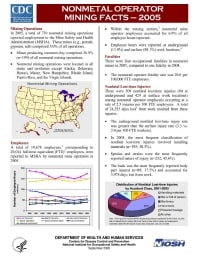Mining Publication: Nonmetal Operator Mining Facts - 2005
Original creation date: September 2008
Authors: National Institute for Occupational Safety and Health
NIOSHTIC2 Number: 20034770
Pittsburgh, PA: U.S. Department of Health and Human Services, Public Health Service, Centers for Disease Control and Prevention, National Institute for Occupational Safety and Health, DHHS (NIOSH) Publication No. 2008-152, 2008 Sep; :1-2
Mining Operations: In 2005, a total of 739 nonmetal mining operations reported employment to the Mine Safety and Health Administration (MSHA). These mines (e.g., potash, gypsum, salt) comprised 5.0% of all operations. Mines producing common clay comprised 26.9% (n=199) of all nonmetal mining operations. Nonmetal mining operations were located in all states and territories except Alaska, Delaware, Hawaii, Maine, New Hampshire, Rhode Island, Puerto Rico, and the Virgin Islands. Employees: A total of 19,678 employees, corresponding to 20,014 full-time equivalent (FTE) employees, were reported to MSHA by nonmetal mine operators in 2005. Within the mining sectors, nonmetal mine operator employees accounted for 6.9% of all employee hours reported. Employee hours were reported at underground (11.9%) and surface (88.1%) work locations. Fatalities: There were four occupational fatalities in nonmetal mines in 2005, compared to one fatality in 2004. The nonmetal operator fatality rate was 20.0 per 100,000 FTE employees. Nonfatal Lost-time Injuries: There were 509 nonfatal lost-time injuries (80 at underground and 429 at surface work locations) among nonmetal operator employees occurring at a rate of 2.5 injuries per 100 FTE employees. A total of 24,555 days lost from work resulted from these injuries. The underground nonfatal lost-time injury rate was greater than the surface injury rate (3.3 vs. 2.4 per 100 FTE workers). In 2005, the most frequent classification of nonfatal lost-time injuries involved handling materials (n=195; 38.3%). Sprains and strains were the most frequently reported nature of injury (n=232; 45.6%). The back was the most frequently reported body part injured (n=89; 17.5%) and accounted for 3,978 days lost from work.

NIOSHTIC2 Number: 20034770
Pittsburgh, PA: U.S. Department of Health and Human Services, Public Health Service, Centers for Disease Control and Prevention, National Institute for Occupational Safety and Health, DHHS (NIOSH) Publication No. 2008-152, 2008 Sep; :1-2
- Coal and metal/nonmetal mining facts - 2008
- Coal and Metal/Nonmetal Mining Facts - 2008 (HTML)
- Coal Contractor Mining Facts - 2001
- Coal Contractor Mining Facts - 2002
- Coal Contractor Mining Facts - 2003
- Coal Contractor Mining Facts - 2004
- Coal Contractor Mining Facts - 2005
- Coal Contractor Mining Facts - 2006
- Mining Fact Sheets
- Rib Falls: A Major Ground Control Issue